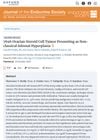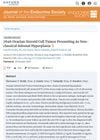Search
for
Sort by
Research
450-480 / 1000+ resultsresearch Notes from the Editor Emeritus: The Empowered Patient
Empowered patients make better healthcare decisions.
research Not Everything Is Telogen Effluvium. Diffuse Alopecia Areata: An Underdiagnosed Entity
Accurate diagnosis of hair loss types is crucial for effective treatment.

research No-Shave Long Hair Follicular Unit Excision Using an All-Purpose Skin-Responsive Device
The new hair transplant technique is fast, effective, and satisfying for patients with different hair types.

research Clinical and Dermoscopic Patterns of Childhood Alopecia Areata in a Tertiary Care Centre in North India
No link between scalp patterns and alopecia severity in children, but more severe cases often had nail abnormalities.
research No Relationship Between Perceived Health Anomalies and Perceived Experimental Success in Retired Breeder Male Hartley Albino Guinea Pigs
Health issues in retired breeder guinea pigs don't affect experiment success.
research Folliculitis Decalvans: Why Is There No Established Treatment?
No established treatment effectively stops inflammation and prevents hair loss in folliculitis decalvans.

research Ovarian Steroid Cell Tumor Presenting as Non-Classical Adrenal Hyperplasia
Early detection of ovarian steroid cell tumors is crucial to prevent lasting symptoms.

research Ovarian Steroid Cell Tumor Presenting As Non-Classical Adrenal Hyperplasia
Ovarian steroid cell tumors can mimic adrenal hyperplasia, and surgery can normalize hormone levels.
research Novel Natural Lipids Based NLC Containing Finasteride Improved Androgenetic Alopecia Treatment in Rats
Finasteride in lipid carriers improved hair growth in rats.

research Comparative Study Between Follicular Unit Extraction Technique With or Without Platelet-Rich Plasma in Non-Androgenic Alopecia
PRP did not significantly improve hair restoration results but improved scar tissue quality.

research Trichoscopy as a Diagnostic Method in Non-Scarring Alopecia
Trichoscopy is a quick, accurate, and non-invasive method to diagnose and treat non-scarring hair loss.

research The Safety and Clinical Efficacy of Iron Infusions in Non-Scarring Alopecia Patients
Iron infusions can help improve hair loss in patients who can't take oral iron supplements.

research Non-Scarring Alopecia in Females: A Comprehensive Review
Non-scarring alopecia in females affects emotional well-being and requires accurate diagnosis and personalized treatment.

research Rose Stem Cell-Derived Exosomes for Hair Regeneration Enhancement via Noninvasive Electroporation in Androgenetic Alopecia
Rose stem cell exosomes can significantly improve hair growth in androgenetic alopecia.

research Application of Non-Pharmacologic Therapy in Hair Loss Treatment and Hair Regrowth
Non-drug therapies show promise for hair regrowth but need more research.

research Exploring the Relationship Between Immune Cells and Non-Scarring Hair Loss: A Mendelian Randomization Study
Certain immune cells are linked to non-scarring hair loss, suggesting potential for immune-targeted treatments.

research Experience in the Treatment of Non-Scarring Alopecia Areata Using a Biomedical Cell Product Based on Autologous Follicular Stem Cells
Autologous follicular stem cells improved hair loss in 57% of patients.

research Elucidating Causal Relationships of Diet-Derived Circulating Antioxidants and the Risk of Non-Scarring Alopecia: A Mendelian Randomization Study
Higher levels of β-carotene and vitamin E may help prevent certain types of hair loss.

research Advancements in Non-Shaven Techniques for Long Hair Restoration
The FUL hair restoration technique is better for aesthetics and causes less scarring.

research Comprehensive Transcriptome Profiling Between Balding and Non-Balding Scalp of Female Pattern Hair Loss in Asian
SFRP2 and PTGDS may be key factors in female hair loss.

research A Prospective Self-Controlled Clinical Trial of Nonactivated Low Leukocyte PRP in Female Pattern Hair Loss Patients of Childbearing Age
Nonactivated low leukocyte PRP injections can significantly increase hair and follicle density in women with alopecia.

research Normolipemic Xanthoma Associated With Folliculotropic Mycosis Fungoides
A man with a type of skin lymphoma had unusual yellowish skin growths despite normal blood lipid levels, and treatment reduced some symptoms but not the growths.

research Novel Investigational Drugs for Alopecia Areata and Future Perspectives
JAK inhibitors are safe and effective for treating moderate-to-severe alopecia areata.

research Novel Variant in WNT10A Caused Short Anagen Hair Syndrome in a Chinese Pedigree
A new change in the WNT10A gene caused a condition leading to short hair growth in a Chinese family.

research Discovery Of A Novel And Highly Selective JAK3 Inhibitor As A Potent Hair Growth Promoter
MJ04, a new compound, effectively promotes hair growth and is a potential topical treatment for hair loss.

research Epidermal Growth Factor Receptor Mutant T790M-L858R-V948R Inhibitor from Calophyllum Inophyllum L. Leaf as Potential Non-Small Cell Lung Cancer Drugs
A compound from Calophyllum inophyllum L. leaf may help treat non-small cell lung cancer.

research The Role of Rs6152 Allele and Non-Genetic Factors in Androgenetic Alopecia: A Pilot Study in the Indonesian Local Population
The rs6152 allele is not a good marker for baldness in the Indonesian population, but family history, age, gender, high blood pressure, and body weight are linked to the risk.

research Association Between Non-Scarring Alopecia and Hypothyroidism: A Bidirectional Two-Sample Mendelian Randomization Study
The study found that alopecia areata and hypothyroidism increase the risk of each other, but androgenetic alopecia and hypothyroidism do not.

research The Role of Wnt and Shh Signaling Systems in Noggin-Induced Tumorigenesis
Wnt and Shh signaling are key in noggin-induced tumors, and blocking them can slow tumor growth.